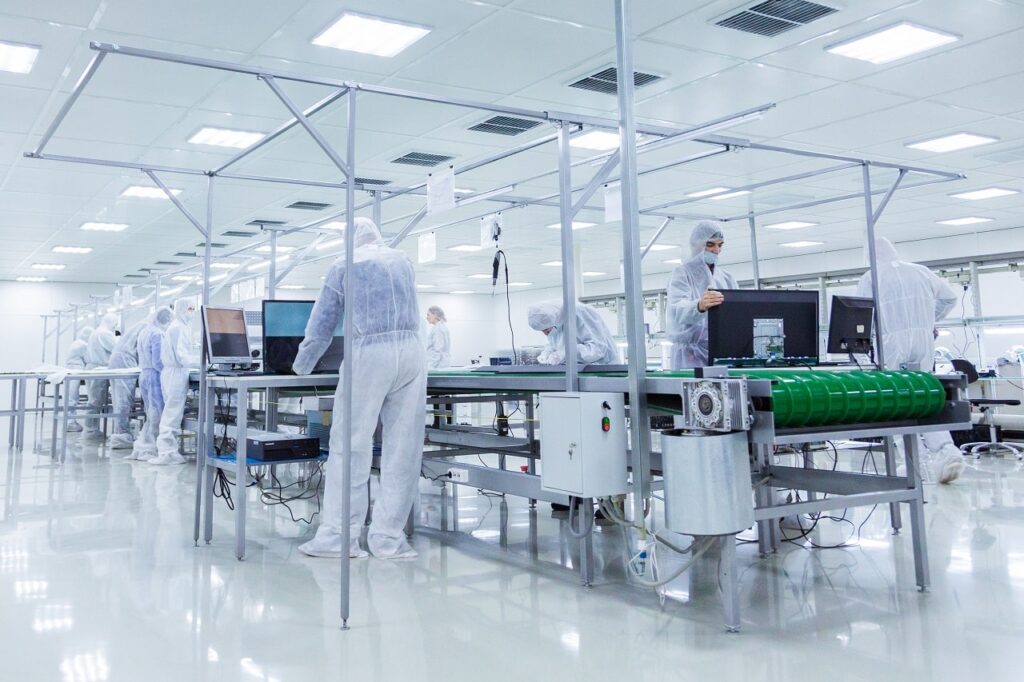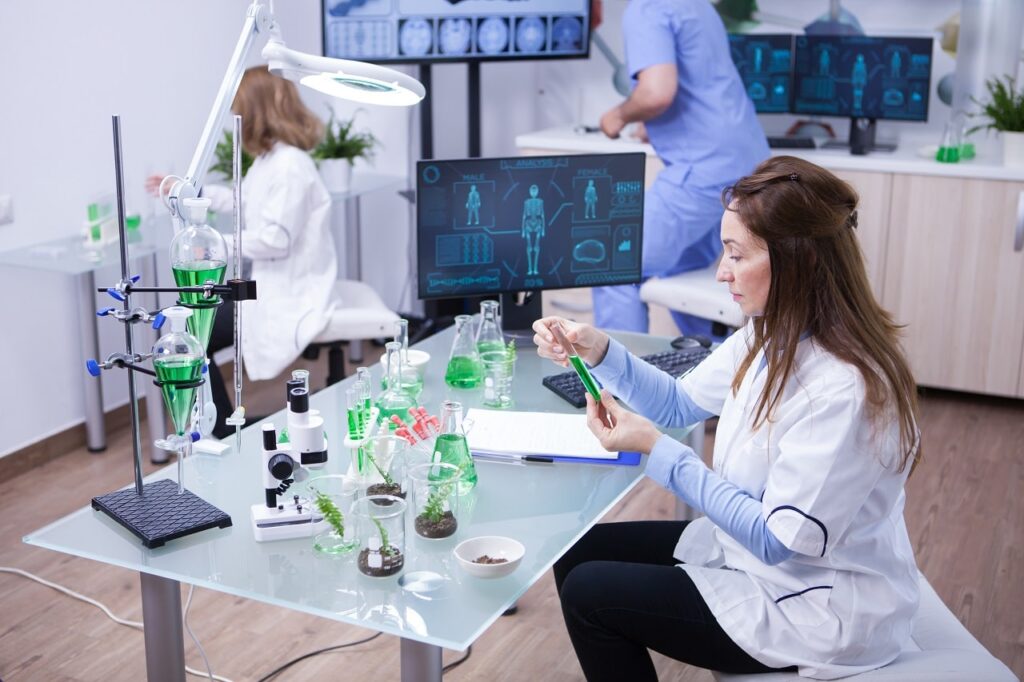Introduction
In recent years, industrial biotechnology has emerged as a groundbreaking field with immense promise for revolutionizing the manufacturing industry. Industrial biotech combines biology and engineering to utilize microorganisms and enzymes in developing sustainable and cost-effective solutions for various industrial processes. This innovative discipline offers transformative opportunities to address global challenges while minimizing environmental impact, from biofuels and bio-based chemicals to pharmaceuticals and textiles.

What is Industrial Biotechnology?
Industrial biotechnology, often known as “White biotechnology,” is a subfield of Biotechnology that employs living creatures, biological systems, and biological processes to create new goods and enhance existing ones in the manufacturing sector. In business, “biotechnology” refers to using physical agents like living cells, enzymes, and so on to produce valuable items or accomplish practical activities. Industrial biotech paves the way for a bio-based economy by offering greener alternatives to conventional manufacturing.
Applications of Industrial Biotech
-
Biofuels: A Renewable Energy Alternative
Industrial biotechnology, also known as White biotechnology, is a subfield that employs biological processes, organisms, or systems to create or enhance industrial products or procedures—utilizing living cells, enzymes, or other biological agents to produce valuable products or carry out specific functions in industrial settings. Industrial biotech offers sustainable alternatives to conventional manufacturing practices and creates new opportunities for developing a bio-based economy by utilizing the power of nature.
-
Pharmaceuticals: Advancing Medicine through Biomanufacturing
Pharmaceutical biomanufacturing relies heavily on the contributions of industrial biotech. Genetically engineering microbes or cell cultures may manufacture therapeutic proteins, vaccines, antibiotics, and other pharmaceutical items. Biomanufacturing offers advantages such as higher product yields, improved purity, and reduced production costs compared to traditional chemical synthesis methods, contributing to the development more affordable and accessible medicines.
-
Bio-based Chemicals: A Sustainable Alternative to Petrochemicals
Industrial biotechnology is instrumental in producing bio-based chemicals and offering sustainable petrochemical alternatives. Plastics, solvents, and specialized chemicals may all be manufactured by biotechnological procedures since they use sustainable feedstocks like sugars or plant oils. The manufacture of conventional chemicals has a significant adverse environmental effect that may be lessened by switching to bio-based chemicals.
-
Textiles: Enhancing Sustainability in the Fashion Industry
The textile industry is embracing industrial biotechnology to address sustainability challenges. Biotechnological approaches can produce bio-based fibers, such as biopolymers and recombinant proteins, which offer advantages such as biodegradability, reduced environmental footprint, and improved performance characteristics. From sustainable fashion to advanced technical textiles, industrial biotech makes the textile industry more eco-friendly and resource-efficient.
Benefits of Industrial Biotechnology
-
Environmental Sustainability and Reduced Carbon Footprint
Industrial biotechnology offers significant environmental benefits by reducing the carbon footprint of various industries. Greenhouse gas emissions, reliance on finite fossil resources, and the discharge of potentially dangerous chemicals may all be reduced using renewable feedstocks and bioprocesses. The worldwide goals of reducing greenhouse gas emissions and protecting the planet’s natural resources are supported by this long-term strategy.
-
Resource Efficiency and Waste Reduction
Industries can optimize resource utilization and minimize waste generation by applying industrial biotech. Bioprocesses often utilize abundant or derived feedstocks from waste materials, reducing the strain on limited resources. Additionally, biotechnological approaches enable the utilization of byproducts and waste streams, transforming them into valuable materials or energy sources.
-
Economic Growth and Job Creation
The widespread use of industrial biotech might help the economy expand and provide more people with stable employment.
Innovation, capital formation, and the expansion of environmentally responsible enterprises may all be stimulated by introducing bio-based industries and biotechnological procedures. It generates employment opportunities in several fields, including R&D, manufacturing, and ancillary services.
-
Enhanced Product Performance and Functionality
Biotechnology-driven manufacturing processes often result in products with improved performance and functionality. Genetic engineering and optimization of biological systems can tailor the properties of materials, chemicals, and pharmaceuticals to meet specific requirements. This opens up new possibilities for creating high-performance products with enhanced characteristics and functionality.
Challenges and Future Outlook
-
Regulatory and Safety Considerations
Comprehensive regulatory frameworks are necessary to assure the safety, risk assessment, and public acceptability of genetically modified organisms, the possible dangers associated with biocontainment, and the introduction of innovative goods. Establishing strict rules that balance innovation and environmental and human health protection requires the combined efforts of governments, industry players, and scientific communities.
-
Scaling Up Production and Commercialization
To realize the full potential of industrial biotech, scaling up production processes and commercialization is a critical challenge. Overcoming technological, logistical, and fiscal obstacles is necessary to scale production from the lab to the factory. Innovations in process engineering, bioreactor design, and supply chain optimization are required to facilitate low-cost manufacturing and broad acceptance of biotechnological solutions.
-
Integration with Traditional Manufacturing Processes
Industrial biotech should aim to complement and integrate with traditional manufacturing processes rather than replace them entirely. Coexistence with established industries requires strategies for hybrid methods that combine the strengths of both biotechnology and conventional manufacturing. Integration approaches should consider factors such as compatibility, process optimization, and infrastructure development to facilitate smooth transitions and maximize the benefits of industrial biotech.
-
Emerging Technologies and Research Areas
The future of industrial biotech holds exciting possibilities with emerging technologies and research areas. Advancements in synthetic biology, metabolic engineering, and bioinformatics offer new tools and strategies for designing and optimizing biological systems. Additionally, research focuses on exploring novel feedstocks, improving bioprocessing efficiency, and expanding the scope of applications. Ongoing collaboration between academia, industry, and government institutions drives innovation and paves the way for transformative breakthroughs in the field.
Conclusion
Industrial biotechnology transforms manufacturing by providing sustainable and efficient alternatives to traditional processes. This field offers diverse applications that contribute to environmental Sustainability, resource efficiency, and economic growth, from biofuels and pharmaceuticals to bio-based chemicals and textiles. While challenges exist, collaborations and advancements in regulation, scaling up, and integration will drive the future success of industrial biotech. With ongoing research and technological developments, the potential for innovation and positive impact on society is immense.
FAQs for Industrial Biotechnology
What industries can benefit from industrial biotechnology?
Almost every industry, including agriculture, pharmaceuticals, chemicals, textiles, and energy, can benefit from the advancements in industrial biotechnology.
What are the key innovations in industrial biotechnology?
Key innovations include the development of biofuels, biochemicals like biodegradable plastics, and biopolymers derived from renewable biomass sources.
What are the challenges facing industrial biotechnology?
Challenges include technical difficulties in scaling production, regulatory issues, and economic factors affecting market acceptance of bio-based products.
What does the future hold for industrial biotechnology?
The future of industrial biotechnology is promising, with advancements in genetic engineering and bioprocessing techniques contributing to a more sustainable industrial landscape.

